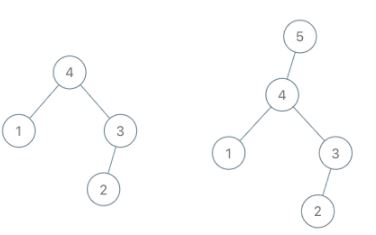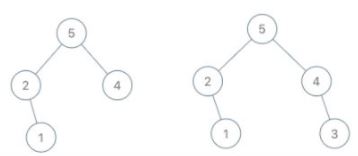Problem
A maximum tree is a tree where every node has a value greater than any other value in its subtree.
You are given the root of a maximum binary tree and an integer val.
Just as in the previous problem, the given tree was constructed from a list a (root = Construct(a)) recursively with the following Construct(a) routine:
If
ais empty, returnnull.Otherwise, let
a[i]be the largest element ofa. Create arootnode with the valuea[i].The left child of
rootwill beConstruct([a[0], a[1], ..., a[i - 1]]).The right child of
rootwill beConstruct([a[i + 1], a[i + 2], ..., a[a.length - 1]]).Return
root.
Note that we were not given a directly, only a root node root = Construct(a).
Suppose b is a copy of a with the value val appended to it. It is guaranteed that b has unique values.
Return Construct(b).
Example 1:
Input: root = [4,1,3,null,null,2], val = 5
Output: [5,4,null,1,3,null,null,2]
Explanation: a = [1,4,2,3], b = [1,4,2,3,5]
Example 2:
Input: root = [5,2,4,null,1], val = 3
Output: [5,2,4,null,1,null,3]
Explanation: a = [2,1,5,4], b = [2,1,5,4,3]
Example 3:
Input: root = [5,2,3,null,1], val = 4
Output: [5,2,4,null,1,3]
Explanation: a = [2,1,5,3], b = [2,1,5,3,4]
Constraints:
The number of nodes in the tree is in the range
[1, 100].1 <= Node.val <= 100All the values of the tree are unique.
1 <= val <= 100
Solution
/**
* Definition for a binary tree node.
* function TreeNode(val, left, right) {
* this.val = (val===undefined ? 0 : val)
* this.left = (left===undefined ? null : left)
* this.right = (right===undefined ? null : right)
* }
*/
/**
* @param {TreeNode} root
* @param {number} val
* @return {TreeNode}
*/
var insertIntoMaxTree = function(root, val) {
var nodes = [];
var now = root;
while (now) {
nodes.push(now);
now = now.right;
}
for (var i = nodes.length - 1; i >= 0; i--) {
if (nodes[i].val < val) continue;
nodes[i].right = new TreeNode(val, nodes[i].right);
return root;
}
return new TreeNode(val, root);
};
Explain:
nope.
Complexity:
- Time complexity : O(n).
- Space complexity : O(n).


